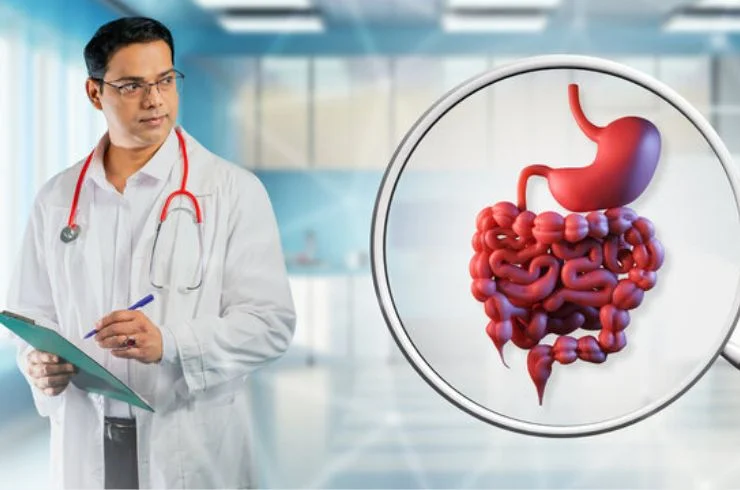Department of Gastroenterology
- Home
- Medical Services
- Department of Gastroenterology

Aditya Hospitals Gastroenterology Department is at the forefront of digestive healthcare, featuring state-of-the-art endoscopic apparatus for comprehensive examinations of the entire gastrointestinal system. Our specialized unit is dedicated to addressing a spectrum of issues concerning the digestive organs, including the stomach, bowels, liver, and gallbladder. Through cutting-edge diagnostic and therapeutic procedures, our team utilizes advanced lighted scopes to gain insights into internal organs, providing accurate diagnoses and effective interventions.
Key Services:
Inpatient Services for Liver, Pancreatic, and GIT Diseases: Our Gastroenterology Department provides comprehensive inpatient services for a wide spectrum of conditions related to the liver, pancreas, and gastrointestinal (GIT) system. This includes the management of liver diseases such as cirrhosis, hepatitis, and fatty liver disease, as well as pancreatic disorders like pancreatitis and pancreatic cancer. Additionally, we offer specialized care for various GIT issues, including accidental toxic ingestion and inflammatory bowel diseases.
Diagnostic Procedures:
Upper GI Endoscopy: Upper GI endoscopy is a vital diagnostic procedure performed using an endoscope to visualize and examine the upper gastrointestinal tract, including the esophagus, stomach, and duodenum. This procedure allows for the detection and evaluation of conditions such as ulcers, inflammation, tumors, and gastroesophageal reflux disease (GERD), enabling timely diagnosis and treatment planning.
Colonoscopy: Colonoscopy is a comprehensive screening and diagnostic procedure used to examine the entire length of the colon and rectum using a flexible colonoscope. It plays a crucial role in the detection and diagnosis of colorectal conditions such as polyps, colorectal cancer, inflammatory bowel disease (IBD), and diverticulosis. Colonoscopy is essential for early detection, surveillance, and management of various gastrointestinal disorders.
Sigmoidoscopy: Sigmoidoscopy is a diagnostic procedure focused on the lower part of the colon, specifically the sigmoid colon and rectum. It involves the insertion of a sigmoidoscope to visualize and assess the lining of the colon for abnormalities such as inflammation, polyps, and hemorrhoids. Sigmoidoscopy is particularly useful for evaluating rectal bleeding, abdominal pain, and changes in bowel habits.
Therapeutic Procedures:
Endoscopic Variceal Ligation: Endoscopic variceal ligation (EVL) is an advanced therapeutic procedure used to treat esophageal varices, which are dilated veins in the esophagus often associated with liver cirrhosis. EVL involves the placement of rubber bands around the varices to prevent bleeding and reduce the risk of complications such as gastrointestinal hemorrhage and liver decompensation.
Bleeding Ulcers Management: Bleeding ulcer management involves the use of endoscopic techniques to control and treat bleeding ulcers in the upper gastrointestinal tract. These techniques may include injecting medications, applying thermal therapy, or clipping the bleeding vessel to achieve hemostasis and prevent further bleeding and complications.
Foreign Body (FB) Removal: Foreign body removal is a specialized endoscopic procedure used to extract objects or foreign bodies that have been ingested and become lodged in the gastrointestinal tract. This procedure is essential for preventing complications such as perforation, obstruction, and gastrointestinal bleeding, ensuring the safe and efficient removal of foreign objects.
PEG (Percutaneous Endoscopic Gastrostomy): PEG is a therapeutic procedure involving the placement of a feeding tube directly into the stomach through the abdominal wall under endoscopic guidance. This procedure is commonly performed in patients who are unable to swallow or adequately consume food orally due to various medical conditions such as stroke, head injury, or neurological disorders. PEG provides a means of delivering nutrition and medications directly into the stomach, ensuring adequate nutritional support and improving patient outcomes.
At Aditya Hospitals, our Gastroenterology Department emphasizes a patient-centric approach, providing cutting-edge diagnostic and therapeutic solutions for various digestive health concerns. The integration of modern endoscopic technology ensures precision in examinations and interventions.
Our dedicated team of gastroenterologists collaborates closely with other medical departments, ensuring a holistic approach to patient care. With a commitment to excellence, Aditya Hospitals strives to offer comprehensive gastrointestinal services, where advanced technology and specialized expertise converge to enhance patient outcomes and promote digestive health.

